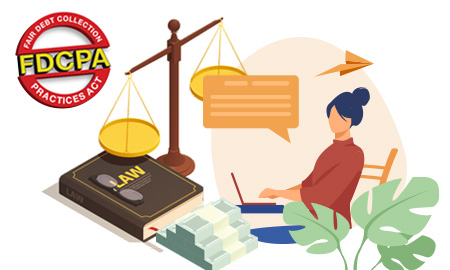Debt collection is a complex and vital process in the financial markets. Organizations that manage the collection and processing of payments play a critical role. To regulate these activities and protect consumers, the Consumer Financial Protection Bureau (CFPB) oversees the consumer debt collection industry nationwide. Recognizing the impact of debt collection on individuals, Congress passed the Fair Debt Collection Practices Act (FDCPA) to curb abusive practices. These practices have led to personal bankruptcies, marital instability, job losses, and invasions of privacy.
Why the FDCPA Matters
The FDCPA aims to shield consumers from abusive debt collection practices and ensures fair competition among debt collectors. As Congress noted, the act protects “debt collectors who refrain from using abusive debt collection practices” from being unfairly disadvantaged in the market.
Like consumers, many small businesses faced severe financial strain during the pandemic. Abusive debt collection practices only compounded these challenges, prompting the Federal Trade Commission (FTC) to act against unlawful collection activities targeting small businesses. This underscores the need for additional protections for small businesses and entrepreneurs.
Key Provisions of the Fair Debt Collection Practices Act
Congressional Findings and Declarations
- Offensive Practices: The FDCPA was necessitated by evidence of deceitful and unfair debt collection practices. These practices have contributed significantly to personal bankruptcies, marital instability, job losses, and privacy invasions.
- Inadequate Existing Laws: Before the FDCPA, existing laws and procedures were insufficient to protect consumers from abusive debt collection practices.
- Non-Abusive Collection Methods Available: The FDCPA acknowledges that debts can be collected effectively without misrepresentation or abuse.
- Interstate Commerce Impact: Abusive debt collection practices significantly impact interstate commerce, even within a single state.
- Purpose: The FDCPA aims to eliminate abusive debt collection practices, protect ethical debt collectors from competitive disadvantages, and encourage uniform state action to safeguard consumers.
Regulations on Consumer Interaction
- Contacting Consumers: Debt collectors can only contact consumers about debt collection with prior consumer approval or court permission. They can contact consumers only between 8 a.m. and 9 p.m. They need prior employer/consumer consent to communicate at the workplace.
- Third-Party Interaction: Debt collectors cannot communicate with third parties about a consumer’s debt without consent, court permission, or the necessity to enforce a judicial remedy.
- Ceasing Communication: If a consumer notifies the debt collector in writing that they refuse to pay the debt, the collector must cease further communication except to inform the consumer of specific actions or remedies.
Harassment, Abuse, and Misleading Practices
- Harassment or Abuse: Debt collectors are prohibited from engaging in conduct that harasses, oppresses, or abuses any person in connection with debt collection. This includes threats of violence, use of obscene language, and repeated calls intended to annoy or harass.
- False or Misleading Representations: Debt collectors must not use false, deceptive, or misleading representations in debt collection. This includes false claims about the character or amount of debt, false implications of legal action, and misrepresentation of the debt collector’s identity.
Unfair Practices
Debt collectors must not use unfair means to collect debts. This includes unauthorized charges, accepting postdated checks without notice, depositing postdated checks prematurely, and communicating with consumers via postcards or using deceptive symbols on mail.
Validation of Debts
- Notice of Debt: Within five days of the initial communication, debt collectors must provide consumers with a written notice detailing the amount of the debt, the creditor’s name, and a statement of the consumer’s right to dispute the debt within 30 days.
- Disputed Debts: If a consumer disputes the debt in writing within 30 days, the collector must cease collection until verification is provided. Debt collectors may continue with the collections activities if they do not violate the FDCPA and if the consumer has not disputed the debt within 30 days.
A Closer Look at the FDCPA’s Impact
“Abusive debt collection practices contribute significantly to personal bankruptcies, marital instability, job loss, and invasion of privacy.” This statement from Congress highlights these practices’ profound impact on individuals and families nationwide. The FDCPA aims to foster a more ethical and just debt collection industry by addressing these issues.
The pandemic has further emphasized the importance of protecting small businesses from unfair practices. The FTC’s efforts to combat unlawful collection practices targeting small businesses illustrate the broader scope of the FDCPA’s protective measures.
Conclusion
The FDCPA’s role is crucial in safeguarding consumers and ensuring fair debt collection practices. Expanding its scope to include protections for small businesses is a significant policy consideration. Such changes would require legislative action by Congress and the president’s signature. The ongoing efforts to strengthen debt collection regulations underscore the importance of safeguarding consumers and businesses from abusive practices.
Following the FDCPA, debt collectors can maintain ethical standards, protect consumer rights, and foster a fair and competitive marketplace.
For more insights, please read our blog on “Why is it Important to Choose a PCI DSS Certified Call Center?”


